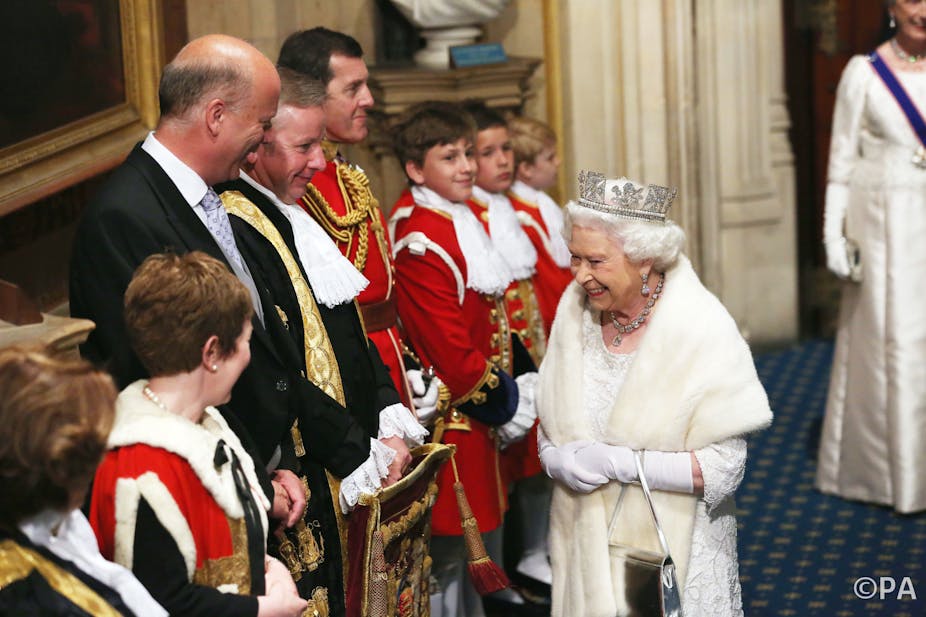The suggestion that the British Queen “backs Brexit” from the European Union, as reported in The Sun newspaper – and subsequently across the UK press – is more than just a juicy story.
Buckingham Palace has complained to the Press Complaints Commission about the story and we may never know if it’s true or not. But either way, the case raises some interesting constitutional questions.
While many people who think Britain should leave the EU will have been delighted that Her Majesty appeared to agree with them, they should think about the bigger picture. Leaving aside the mystery of who leaked the story, it highlights a lack of joined-up constitutional thinking from the Brexit camp.
People campaigning for Britain to leave the EU often make constitutional arguments. They say they want to protect or recover the British parliament’s sovereignty. The EU, so their argument goes, prevents the national parliament from doing as it wishes. I do not agree with that assessment, but do have greater sympathy with the traditional constitutional position underpinning it.
The idea that the elected parliament may ultimately pass whatever legislation it sees fit is one of the most important parts of British constitutional democracy.
One of the other traditional pillars of the British constitution is the political neutrality of the monarch. The existence of the hereditary monarchy is predicated upon its public impartiality.
The implications of leaking a story – true, or not – that looks a lot like an attempt to use the Queen’s opinions as political capital are really quite serious. It is unlikely that the source of this story intends to undermine how the British constitutional monarchy operates, but that is exactly what they are risking.
And so it is ironic that in what might be an attempt to protect what they see as one constitutional fundamental, whoever leaked this story about the Queen has been prepared to undermine another, equally traditional and symbolically important institution.
The ‘dignified’ monarch
Technically, the Queen has some highly significant powers. Most notably, she is responsible for appointing the prime minister – who governs on her behalf – and for granting royal assent to parliamentary bills. The legitimacy of giving such power to a hereditary monarch is ensured by two factors.
First, the Queen’s actions are regulated by conventions that essentially prevent the monarch from using their own initiative. The prime minister, for example, must be the person most likely to command the confidence of the House of Commons, and each outgoing prime minister is usually expected to inform the monarch as to who this is. That person is naturally the one who has the backing of the most number of elected members.
Second, the monarch must be politically neutral, at least in public. The reason is simple. If the British people are to accept a hereditary monarch with very real, if restricted, powers, then that monarch must be seen to be above politics. They must act as the “dignified” part of the constitution.
This underpins the entire monarchy. It is why the Prince of Wales’s habit of writing letters to ministers has caused so much concern and led to high-profile litigation. Were the monarch’s neutrality to be compromised it could lead to a major upheaval of the monarch’s role.
Constitutional myopia?
All this highlights a broader issue. This is not the first time that people seeking to modify the relationship between the UK and the EU have lost sight of wider constitutional principles in their desire to reassert a perceived loss of sovereignty.
In December, Brexit campaigner and justice minister, Michael Gove, suggested to the House of Lords Constitution Committee that the UK might benefit if the proposed British bill of rights mandated a “constitutional long-stop” court. This would be able to declare EU law incompatible with UK constitutional norms. It was a statement at least partly articulated from the same eurosceptic position behind the Vote Leave campaign he is currently helping to lead.
The issue here is one of genies and bottles. At present, British courts are generally deferential to parliament. In the past it has been indicated that if an EU law conflicted with a fundamental constitutional statute, or if a statute expressly stated that it must take precedence over EU law, the courts would go with the domestic law. This position gives the last word to a sovereign parliament.
If, on the other hand, the courts were allowed to ignore EU law on the basis of constitutional principles, they might end up invalidating incompatible domestic legislation as well. This might mean parliament ceases to be sovereign. A constitutional court could have the final word on the validity of primary law.
Playing one constitutional principle off against another is a dicey game. A single-minded focus on sovereignty may have undesirable side effects.
In the case of The Sun story, if Brexiters are happy for the Queen to express her views in this case, then perhaps they’d be willing to let her express her views on any other political issue in the future – even if those views doesn’t chime with their own agenda.

